
LAWRENCE LI
PRESIDENT & CEO
Lawrence serves as the President & CEO of Dobility, focused on scaling Dobility’s impact and allowing the organization to bring affordable, high-quality data to a growing set of users and contexts.
Before joining Dobility, Lawrence spent most of his career as an investor, with experience in both private and public markets. He started his career with the Boston Consulting Group after receiving a Bachelor of Science degree in industrial and systems engineering from Georgia Tech.
Lawrence is based in Cambridge, Massachusetts.
Good to know
Lawrence is an avid traveler with a particular appreciation for global cuisines.
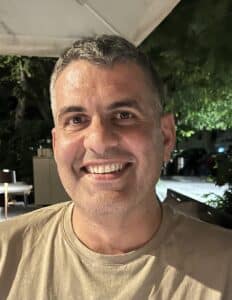
MELETIS MARGARITIS
DIRECTOR OF ENGINEERING
Meletis is Dobility’s Director of Engineering, the lead engineer behind SurveyCTO and the oldest employee of Dobility. Over the last 22 years, he has designed and developed a variety of software applications using cutting-edge technologies.
Meletis’s career as a software engineer started at the age of 10, when he developed a phonebook application for the DOS operating system using ANSI C. He had to use the English-Greek vocabulary to translate the C tutorial at the same time. Much later, during his Ph.D., he developed a proprietary protocol using TCP/IP sockets in order to build a framework to facilitate peer-to-peer synchronous collaboration in small groups through computer screens. He is always keen to tackle projects that require innovation, scalability, performance, and big data.
Meletis is based in Athens, Greece.
Good to know
Meletis is a painter, a chess player, a volleyball player, and a fan of the movies. He spends his free time playing with his two young children.

MIKE ACETI
CFO
Mike started working with Dobility in 2014 and is now the company’s consulting CFO.
Mike has over 25 years of financial and operational experience in a wide range of industries including biotechnology, life sciences, medical device, high tech, software, consulting, consumer products, financial services, and non-profit. He has worked with companies of all sizes including start-ups, small, mid-size, and large multi-national corporations. Mike received a BA in Economics at Saint Lawrence University and an MBA in finance and strategy at The University of Chicago.
Mike is based in Cambridge, Massachusetts.
Good to Know
Mike loves fishing, gardening, seeing new places, and exploring New England. He is easily distracted in book stores and libraries; the only way he can leave them is to stare at the floor on his way out.

AMBER LISKEY
Customer Support Associate
Amber is a member of Dobility’s Customer Success team.
Prior to joining Dobility, Amber worked as a senior analyst specializing in data collection and research focused on food security and livelihoods in Africa and the Middle East. She also has extensive fieldwork experience through her role as a Peace Corps extension agent in southern Senegal, where she worked alongside local farmers to achieve more sustainable agricultural practices and improve crop yields in a changing climate.
Her undergraduate background is in fine art and environmental studies, and she holds two Masters of Science degrees in Community Planning and Sustainable Design from the University of Texas at Austin School of Architecture.
Amber is based in Dakar, Senegal.
Good to know
Amber enjoys having an early morning cup of coffee on the balcony each day, making art when there is time, and sharing food with friends and family. She was born and raised in the beautiful Shenandoah Valley in Virginia.
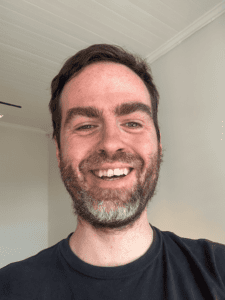
AMRIK COOPER
DIRECTOR OF CUSTOMER SUCCESS
Amrik is a member of Dobility’s Customer Success team. He plays a key role in plans to improve SurveyCTO which are informed by user needs.
Before joining Dobility, he co-founded ikapadata, a South African survey research consultancy with a founding principle of adopting digital data collection systems. Amrik has been involved in every stage of survey planning, fieldwork, data analysis, and reporting on numerous projects of different types including market research, social program evaluations, household studies, and experimental behavioral studies.
As an early adopter of the SurveyCTO platform, Amrik started consulting in his previous role as a SurveyCTO form developer on large surveys for clients such as Innovations for Poverty Action (IPA) and the International Food Policy Research Institute (IFPRI). He has worked on SurveyCTO-based surveys that have been deployed in Bangladesh, Malawi, Mali, South Africa, and Zambia. He holds a Masters of Sociology degree from the University of Cape Town.
Amrik is based in Cape Town, South Africa.
Good to know
Amrik is a one-time semi-professional musician and plays bass guitar, guitar, drums, and piano. He is most at peace in the kitchen.
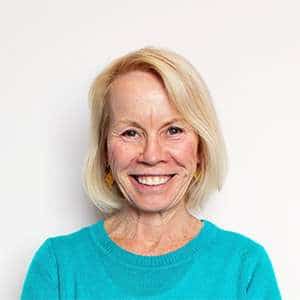
ANNE KAPLAN
CONTROLLER
Anne is Dobility’s part-time Controller and oversees all of its accounting functions.
She started her career in public accounting at KPMG and transitioned to managerial roles leading all aspects of accounting, budgeting, forecasting, and financial reporting with both large and small companies. Anne holds a B.S. in Business Administration from Stonehill College. She enjoys volunteering and recently served as Board President of The Second Step, an organization dedicated to adult and child survivors of domestic violence. Anne has also volunteered at the Massachusetts Attorney General’s Office.
Anne is based in Cambridge, Massachusetts.
Good to Know
Anne enjoys golfing, hiking, and also loves to read mystery novels and solve jigsaw puzzles.

CAROLINE BURKE
VICE PRESIDENT OF OPERATIONS
Caroline’s career began in nonprofit operations, focusing in the K-12 education space. She most recently served as Director of Enrollment & Governance for UP Education Network, where she was responsible for student recruitment and enrollment, school and board governance, and compliance over a network of six schools across Massachusetts. She holds a Bachelor’s Degree in Political Science from the College of the Holy Cross, and spent over two years after college living and working in Dar es Salaam Tanzania as a part of the Jesuit Volunteer Corps.
Caroline is based in Cambridge, Massachusetts.
Good to Know
Caroline enjoys reading, traveling, time outdoors exploring and hiking, and spending time with family and friends, especially over a good meal.
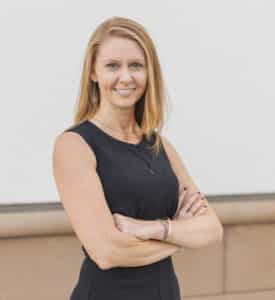
CATHERINE KENDALL
ASSOCIATE ACCOUNT EXECUTIVE
Catherine has over 10 years of experience in the healthcare industry including patient services, patient relations, management and operations, and healthcare innovation. Prior to joining Dobility, she was a founding member of the Mayo Clinic Innovation Exchange where she helped startup founders from around the world connect with medical subject matter experts to further the advancement of innovative technologies and solutions. In addition to her professional activities, Catherine has volunteered in various capacities in India, Zimbabwe, Bolivia and Thailand. She has a B.A. in Communication Studies and a masters degree in International Management.
Catherine is based in Jacksonville, Florida.
Good to Know
For fun Catherine runs races, although the “fun” part can be debated. She also enjoys rock climbing, exploring new places, spending time with her family, and catching a beach sunrise whenever possible.

JULIE LUTZ
PRODUCT SPECIALIST
Julie is joining the Dobility product team as a Product Specialist. Julie has worked in a variety of software development and product management positions with a focus on elearning for the past decade. In her latest role as co-founder of Hello PLATO, Julie helped develop a teach-by-text tool that improves learning reach in low-bandwidth environments. Julie is deeply aligned with Dobility’s mission of empowering user success and ultimately informing policy decisions that have a positive social impact.
Julie is based in Asheville, North Carolina.
Good to know
Julie supports and volunteers at several local animal rescues and as a serial “foster failure” now spends her time catering to the wants and whims of her many cats. She also enjoys reading, listening to podcasts, and experiencing the natural beauty of the Appalachian Mountains.

MARIA PERVOVA
BUSINESS DEVELOPMENT MANAGER
Maria implements business development strategy as a member of the Sales team at Dobility. She is passionate about using a data driven approach to improve people’s quality of life and remove barriers to their success.
Maria’s experience spans tech, nonprofit, education, and government sectors. During college, Maria was one of the founding members of a nonprofit organization that provides individuals in need with access to menstrual hygiene products to reduce the stigma around menstrual health. She taught at a university and founded a women’s empowerment group in China as part of the Peace Corps. Over the years, she held various internships in the US government and nonprofits concerning refugee issues, democratic development, and human rights. In the tech sector, she led a development team through the Agile process in projects related to the medical field and national security.
Having lived in China, France, Spain and Hungary, Maria is currently based out of Medellin, Colombia.
Good to know
She was once a rhythmic gymnast and used to be flexible enough to bend “in-half”. Now she satisfies her interest in dance through occasional salsa classes.

MARTA COSTA
SENIOR PRODUCT SPECIALIST
Marta is a member of the Customer Success team for Dobility, focusing on helping users achieve their objectives using SurveyCTO. She works on new ways to help users get the most out of SurveyCTO.
Prior to joining Dobility, Marta worked for CESO Development Consultants, an International Development consultancy, and NOVAFRICA Research Center. Throughout her career, she supported and coordinated impact evaluations, monitoring and evaluation projects, and data collection processes at national level in the areas of education, energy access, and financial inclusion. She lived in Mozambique, Angola, and Sao Tome and Principe. She holds a Master’s Degree in Economics from Nova School of Business and Economics.
Marta is based in Lisbon, Portugal.
Good to know
Marta loves music and dancing, though she hasn’t found the right dance moves for her yet.

MAULIK CHAUHAN
GROWTH CONSULTANT
Maulik is a member of Dobility’s sales team and oversees the India and Asia regions.
With over 15 years of experience in research, data management, and analysis, he brings deep expertise to his role. Prior to joining Dobility, Maulik spent seven years at JPAL South Asia, working on projects related to monitoring and evaluation (M&E) and randomized control trials (RCTs). He has also contributed to international development initiatives with The World Bank, Harvard University, the London School of Economics, MIT, and served as a United Nations consultant, helping African countries transition their CPI data collection from paper to mobile.
Maulik holds a bachelor’s degree in engineering, three master’s degrees (in business administration, public administration, and development studies), a postgraduate diploma in applied statistics, and a certification in data science and Python.
Maulik is based in Ahmedabad, India.
Good to know
Maulik’s passion for the social sector was inspired by a Bollywood movie “Swades”. In his free time, he enjoys traveling, exploring different cultures and traditions, watching regional films, engaging in philanthropy work, and playing music.

MELISSA KUENZI
SENIOR PRODUCT MARKETING SPECIALIST
Melissa comes to Dobility following years in the nonprofit sector managing databases and online software platforms, programs, and fundraising. Prior to her career in nonprofits, she taught English in South Korea after earning her degree in Communications from Trinity Western University in British Columbia, Canada. Following her work as a user of software solutions for the social impact space, she is excited to drive user-focussed product marketing efforts for such a robust platform and looks forward to scaling SurveyCTO alongside her brilliant coworkers at Dobility.
Melissa is based in Portland, Oregon.
Good to Know
In her free time, Melissa can be found gardening, reading, listening to podcasts, tasting wine, cooking, and hiking in the beautiful Pacific Northwest.

MOFYA PHIRI
CUSTOMER RESEARCH ADVISOR
Mofya is part of the Customer Success team for Dobility.
Under his belt he has 8+ years of experience in ICT4D in Malawi, Kenya, Tanzania, South Africa and Zambia. He has done work applying ICT across various sectors including WASH, Education, Agriculture, Climate, Environment and Health, occupying positions such as project manager, system designer, developer, IT specialist, data manager and data analyst.
Very early in his career, he stationed himself to be an ardent learner one who continuously seeks to improve his skills to be at the cutting edge of technology, and applying these in various developmental endeavors. A drive such as this has propelled his passion as channelled in his quality of work.
Mofya is currently based in Lusaka, Zambia.
Good to know
Mofya does not take kindly to heights but he will not pass up an adventure in sight seeing. He enjoys good food, stimulating conversations and at the end of the day he likes to unwind quietly with a book or movie.

NABILA HAMDAOUI
PRINCIPAL SOFTWARE ENGINEER
Nabila is a member of the development team at Dobility.
Nabila has been working as a software engineer since 2013. Before joining Dobility, she worked in multiple companies and startups and contributed in the development of large scale projects with big clients. Nabila is passionate about coding best practices and UI/UX, she always thinks of the end user when implementing new features.
Nabila has also a Ph.D in computer science, her thesis focuses on creating effective, adaptive and engaging educational games. She developed multiple educational games for high school students in Morocco.
Nabila is based in Casablanca, Morocco
Good to know
In her free time Nabila likes to come up with healthy recipes, take nature
and water photos and work on her podcast on well being and self
improvement.

NAJIN KIM
TECHNICAL SUPPORT ASSOCIATE
Najin is a part of the Customer Success team for Dobility.
Najin has a wide array of experience in the international development sector, ranging from community development to peace building, human rights and innovative digital solutions for economic citizenship enhancement in Latin America, Africa and Korea. She is passionate about supporting people to improve their life chances based on a deep understanding of their context and aspirations, as well as the root causes of the problems. She strongly believes that using innovative technologies in these endeavors is not just something nice to have, but an essential part of the strategy in achieving the goals at scale. Her diverse career experience has been very helpful in successfully coordinating among various stakeholders in diverse contexts.
Being from Korea, she calls any places in the world home — she has lived in Asia, North America, Latin America, Europe, Oceania and Africa for work, travel and study. She is fluent in Korean, English and Spanish, and she has worked in Portuguese as well.
Najin is based in Bogotá, Colombia.
Good to know
Najin is an avid coffee drinker, and she loves trying international cuisine.
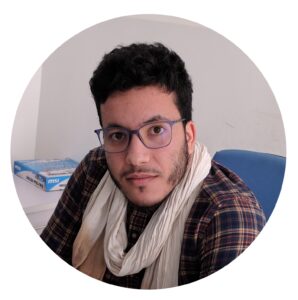
OUSSAMA HTITI
SENIOR SOFTWARE ENGINEER
Oussama is a member of the Dobility development team. With a career spanning France, the Netherlands, and Morocco, Oussama has amassed valuable experience in diverse industries such as telecommunications, finance, and nuclear energy production. Oussama brings a wealth of expertise to the table beyond software development, with a keen focus on optimizing performance and ensuring top-notch security.
Oussama is based in Casablanca, Morocco.
Good to know
Oussama dedicates his free time to coaching local students, engaging in chess matches, and actively working on his well-being and self-improvement.

SHIRLEY SWEENEY
DIRECTOR OF DIGITAL MARKETING
Shirley is the Director of Digital Marketing at Dobility, responsible for enhancing the marketing strategy, growing the company’s brand, and making more people aware of the problems that SurveyCTO solves.
Her professional experience has always been in the various components of marketing, ranging from content to digital to email marketing across a variety of industries including tech, HR software, and lending. Shirley started her career at Experian Data Quality, a business unit at Experian, so she understands the data quality adage of “garbage in, garbage out”! She holds a Bachelor of Science degree in Business Management from Babson College.
Shirley is based in Boston, Massachusetts.
Good to know
Shirley is a homebody whose hobbies include running (she is currently training for a 50-mile ultramarathon), spending way too much at bakeries, and watching reruns of her favorite shows (like The Good Place, Parts Unknown, and How I Met Your Mother).

VIKAS ARORA
CUSTOMER SUCCESS AND QUALITY CONSULTANT
Vikas supports India-based SurveyCTO users as the Customer Success and Quality Consultant.
Prior to joining Dobility India, he worked in the pharmaceutical industry, taught public health courses at university, and managed mHealth projects in rural areas. He enjoys using his background in computer science and his Masters of Public Health to bridge technology and health, and he is passionate about increasing the use of ICT in health and field research. He also likes statistics, playing with data, and designing surveys.
Vikas is based in Ahmedabad, India.
Good to know
Vikas enjoys long drives, photography, Hindi movies, and listening to music. He is from the colorful land of Rajasthan and believes in enjoying every shade of life.

CHRISTOPHER ROBERT
DIRECTOR AND FOUNDER EMERITUS
Chris now serves as Director and Founder Emeritus, supporting Dobility in a variety of part-time capacities. Over the course of Dobility’s first 10 years, he held several positions, including CEO, CTO, and Head of Product.
Before founding Dobility, he was involved in a long-term project to evaluate the impacts of microfinance in South India; developed online curriculum for a program to promote the use of evidence in policy-making in Pakistan and India; and taught statistics and policy analysis at the Harvard Kennedy School. Before that, he co-founded and helped grow an internet technology consultancy and led technology efforts for the top provider of software and hardware for multi-user bulletin board systems (the online systems most prominent before the Internet).
He holds an A.B. in public policy from the University of North Carolina at Chapel Hill, as well as Masters and Ph.D. degrees, also in public policy, from Harvard University.
Chris is based in Henniker, New Hampshire.
Good to know
Chris turns red and starts sweating if he tries to lie or even just hide something he knows he should reveal.
